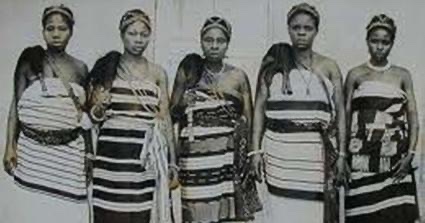
King Jaja of Opobo (1821-1891), the wealthiest and most powerful monarch in the Niger Delta and sole founder of Opobo, was Igbo.
Born in his native Umuduruoha, Amaigbo, present-day, Imo State, and named Mbanaso Okwaraozurumbaa at birth
Born in his native Umuduruoha, Amaigbo, present-day, Imo State, and named Mbanaso Okwaraozurumbaa at birth
he was captured by slave traders and sold into captivity in Bonny at the age of 12, where he earned his way out of slavery having also adopted the Ijaw-Ibani culture.
Though he generated astounding wealth for Bonny, when that kingdom's throne became vacant, his quest to vie for it was politically checkmated by a fellow wealthy slave (wealth was a deciding factor in monarchy)...
Thus, he left with his supporters to and found a new town, Opobo, near Andoni. Bonny and it's affiliated British merchants would come to regret that day.
The new development Jaja (aka Jubo Jubogha) relocated to in 1869, was named Opobo, and the location was strategically positioned that he could transact first hand with both national and international merchants, effectively becoming a monopolist in oil palm trade.
Trade and the resultant wealth exploded so much that his former British trading partners lost £100,000 (in 1870), and Bonny pleaded with him to return (which he refused). He then came to the attention of Queen Victoria....
She was impressed by his influence, recognized him as King of Opobo in 1873 and also personally presented him with a sword in Buckingham Palace in 1875 after he sent troops to assist Britain in the Ashante war.
The scramble for Africa began in the 19th century. Jaja was infamous for resisting foreign political and economic influence and he kept taxing the British merchants much to their indignation.
Greed and the fear of Jaja's influence led the new Consul-General, to invite Jaja out of his kingdom and onboard a ship, ''The Goshawk'', for trade discussions.
Once onboard, a deportation order was served on him. He was illegally tried and convicted in Gold Coast, present-day Ghana, in 1887 and exiled to Saint Vincent in the distant West Indies and to be later relocated to Barbados.
His pleas to return to his kingdom were granted in 1891. Unfortunately, he died in Tenerife, en route Opobo, after allegedly poisoned with a cup of tea. After his death, the influence of Opobo died with him.
His body was received with much sorrow by his people who gave him a full, honourable royal burial. He was 70.
• • •
Missing some Tweet in this thread? You can try to
force a refresh















